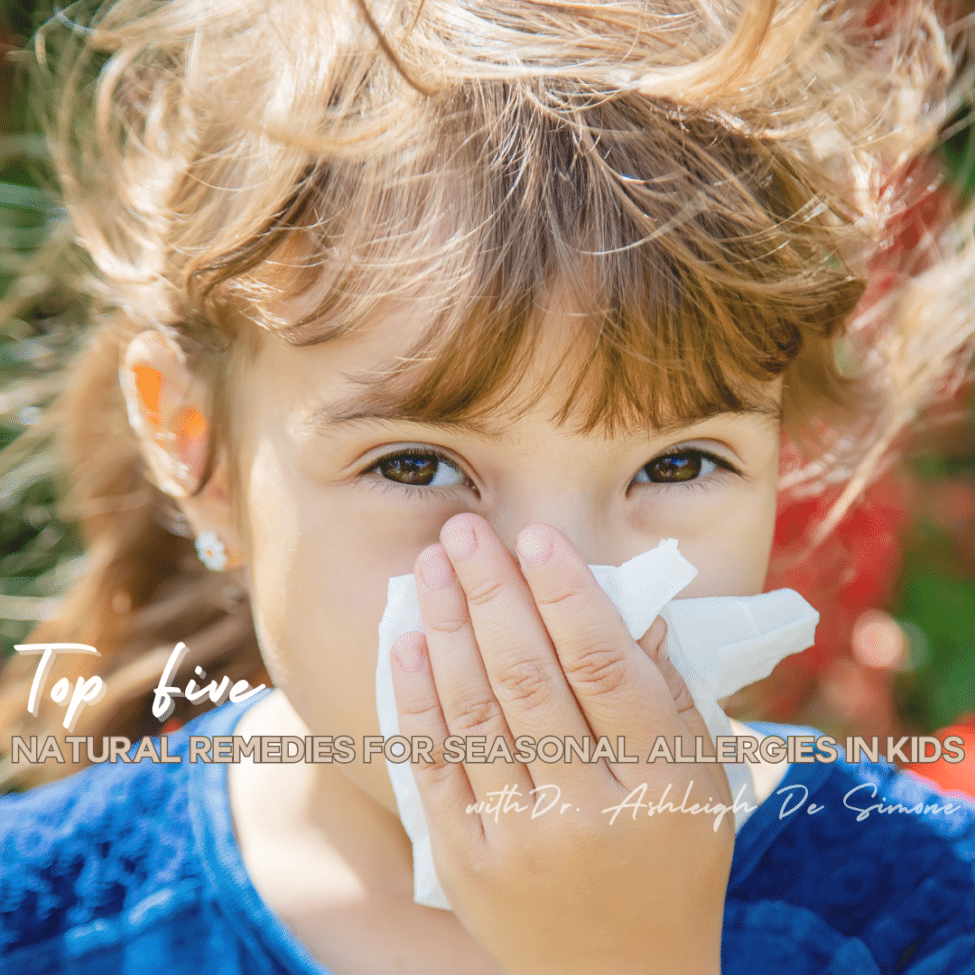Top 5 Natural Remedies for Seasonal Allergies in Kids
by Dr. Ashleigh De Simone
Seasonal allergies, also known as hay fever or allergic rhinitis, are a common concern for kids. These allergies occur when the immune system overreacts to airborne allergens like pollen from trees, grasses, and weeds. According to the Centers for Disease Control and Prevention (CDC), nearly 7% of children in the United States experience seasonal allergies each year. The timing and severity of symptoms often depend on pollen levels in a given area. Children with a family history of allergies or asthma are at a higher risk of developing seasonal allergies.
If your child has seasonal allergies, you may notice symptoms such as sneezing, a runny or stuffy nose, itchy or watery eyes, and an irritated throat. Some children also experience fatigue, coughing, or worsening asthma symptoms. These allergy symptoms can disrupt daily life, making it harder for kids to concentrate in school, sleep well at night, and enjoy outdoor activities. Research published in Pediatrics has shown that children with allergic rhinitis may struggle with focus and academic performance due to sleep disturbances and daytime drowsiness.
Seasonal allergies can impact not only a child’s physical health but also their emotional and well-being and quality of life. Constant symptoms may lead to frustration, irritability, and decreased participation in sports or outdoor play. Fortunately, there are natural, safe, and effective treatment options to help manage allergies.
See Below for the Top 5 Natural Remedies for Seasonal Allergies in Kids.
1.) Quercetin
Quercetin is a potent bioflavonoid found in foods like apples, onions, and berries. It’s known for its ability to reduce inflammation and support the immune system. Quercetin works by reducing the body’s histamine response, much like over-the-counter antihistamines, but without the long-term health impacts. By calming the body’s reaction to allergens, quercetin helps relieve symptoms like sneezing, congestion, and itchy eyes. It also supports respiratory health, which can be especially beneficial for children with both allergies and asthma.
2.) Omega-3 Fatty Acids
Omega-3 fatty acids, found in foods like fatty fish, flaxseeds, and walnuts, are known for their anti-inflammatory properties. Research suggests that omega-3s can reduce inflammation in the body,
which may ease common allergy symptoms such as nasal congestion, sneezing, and itchy eyes. Omega-3s also support immune function, helping to balance the body’s response to allergens. Some studies have shown that children with higher omega-3 intake experience fewer and less severe allergy symptoms during allergy season.
3.) Bromelain
Bromelain is an enzyme found in pineapple that has gained attention for its potential benefits in managing seasonal allergies in children. Known for its anti-inflammatory and mucolytic (mucus-thinning) properties, bromelain can help reduce nasal swelling and congestion, making it easier for children to breathe during allergy season. It also breaks down mucus, which can be particularly helpful for kids dealing with sinus pressure or runny noses caused by pollen allergies. Some studies suggest that bromelain might even reduce inflammation in the nasal passages, alleviating symptoms like sneezing and sinus discomfort.
4.) Nettle
Nettle, also known as Urtica dioica, is a plant with a long history of use as a natural remedy for various conditions, including seasonal allergies. Nettle acts as a natural antihistamine by blocking the release of histamine, the chemical responsible for allergy symptoms like sneezing, itchy eyes, and nasal congestion. Studies suggest that nettle can reduce the severity of allergic rhinitis in children, providing relief from symptoms during peak pollen seasons.
5.) Allium Cepa Homeopathic
Allium cepa, made from onions, is a homeopathic remedy commonly used to treat symptoms of seasonal allergies. It can help relieve symptoms like a runny nose, watery eyes, and sneezing.
Homeopathy works by stimulating the body’s healing processes and balancing the immune system’s response to allergens. For kids with seasonal allergies, Allium cepa can reduce the irritation caused by constant sneezing and nasal discharge.
Schedule with Dr. Ashleigh De Simone
If you have questions about the best approach to addressing seasonal allergies for your kids, schedule a consultation with Dr. Ashleigh De Simone! Dr. De Simone is passionate about pediatric health and completed specialized training in treating chronic conditions in children using safe, gentle, and effective natural remedies. She works to bridge the gap between conventional medical care and integrative medicine by using both new research and traditional naturopathic therapies to guide treatment. For scheduling, call our office at (860) 674-0111.
References
1. Centers for Disease Control and Prevention. Allergies and hay fever. Published 2021. Accessed February 24, 2025. https://www.cdc.gov
2. American Academy of Allergy, Asthma & Immunology. Allergic rhinitis. Published 2023. Accessed February 24, 2025. https://www.aaaai.org
3. Mayo Clinic. Hay fever (allergic rhinitis). Published 2022. Accessed February 24, 2025. https://www.mayoclinic.org
4. Nathan RA, Meltzer EO, Seigle RL, Storms W. The impact of allergic rhinitis on quality of life. Pediatrics. 2020;145(4):e20201129.
5. Shargorodsky J, Zhang L, Lotvalian A, et al. Quercetin as an antihistamine: A comprehensive review of its therapeutic potential in seasonal allergic rhinitis. J Clin Immunol. 2018;38(3):304-314.
6. Simopoulos AP. Omega-3 fatty acids and allergic diseases: The omega-3 connection. J Am Coll Nutr. 2002;21(6):497-506.
7. Gohar M, Fadel S, Kazemian A, et al. Bromelain in allergic rhinitis: A systematic review of clinical studies. Allergy Asthma Clin Immunol. 2015;11(1):6.
8. Thornhill SM, Kelly AM. Natural treatment of perennial allergic rhinitis. Altern Med Rev. 2000;5(5):448-454.

